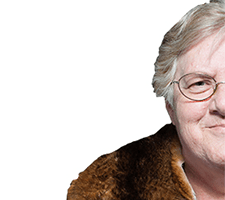Is addicted to Facebook
Became family matriarch at 35
Is an Aboriginal Elder
Speaks out against racism
Identity has never been an issue for Diane Kerr. She has always known that her fair hair comes from her Anglo father and her dark skin from her Aboriginal mum. However, she’s spent much of her life explaining her heritage to others.
“I remember learning about Captain Cook in primary school and the teacher saying there were only a few Aborigines left. I told her there was more than that in my family, but she said she was talking about full bloods. I think how sad it is that they taught people that. Back then (in the 1960s), I wasn’t even a citizen. I was just meant to assimilate.”

She conducts Welcome to Country ceremonies, continuing a tradition that is 60,000 years old, when Elders allowed visiting mobs to enter traditional boundaries.
She is a director of Native Title Services Victoria, chairperson of The Royal Women’s Hospital Community Advisory Committee and member of its consumer committee, ambassador for the Indigenous Leadership Network of Victoria, member of the Dandenong and District Aborigines Co-operative Society and was involved in Melbourne Museum’s First Peoples exhibition.
“I’m proud of who I am and I’m proud that Aboriginal people are still here after everything. Wurundjeri people went down to 68 people after colonisation, and we’re in the thousands now. So it just shows how strong my ancestors were and how adaptable they were because they had to adapt or they’d die. They went through a hell of a lot.”
Aunty Di’s own grandmother left the Coranderrk mission, an Aboriginal government reserve near Healesville, to give birth to her mother in the NSW bush during a time when the government was taking children from Aboriginal families.
Aunty Di is inspired by the women in her family. “My motivation is the resilience of my mother, grandmother and great grandmother. They were very strong women with soft and caring ways. I do feel angry sometimes about the missions and what happened, but if you can’t forgive, your life is not a happy life.”
Today, at 59, she relishes the responsibility of guiding younger generations and works hard to uphold Aboriginal Law in a modern, urbanised world.
“I feel lucky to be alive because Aboriginal health is third world – we die 17 to 20 years younger than non-indigenous people. It stems back to colonisation and the introduction all of these preservatives, sugars and flours. All of our traditional plants and medicines and the meats that we used to eat we are not allowed to have now or they don’t existent anymore.
“Our health is also affected by the trauma of past practices - its effects are trans-generational; it’s carried through. We have Close the Gap (indigenous health funding), but we have a long way to go.”
Aunty Di is adamant that discussion and understanding is essential for Australians to move forward.
“I tell people to contact their local Aboriginal organisation and let themselves be known because a lot of organisations would love you to come in the door. The Aboriginal community is very friendly. Once you become a friend of the community, you’re a friend for life. Which I think is pretty special.
“Nothing will succeed unless we as peoples – Aboriginal and non-Aboriginal – understand each other. We are so multicultural and yet we don’t understand each other’s religion and way of life, customs and laws. So I ask people to talk to each other. It’s being a human being.”
Words by Natalie Filmer
Pictures by Dulce Amor Temporal
Download Racism. Get Up. Speak Out. postcard featuring Aunty Di - 520.22KB
